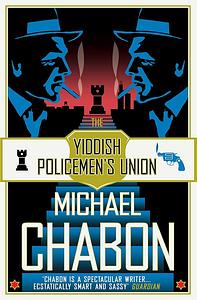Take a photo of a barcode or cover
In this alternative history mystery novel, the USA created a temporary colony for the Jewish people when the new state of Israel was destroyed in 1948. Sitka, Alaska is now a Yiddish-speaking metropolis and Detective Meyer, a middle-aged, alcoholic devorcee, becomes obsessed with finding the killer of his neighbour, a heroin addict with mysterious connections to the chess club Meyer's father pressured him to be in as a child.
Although I wasn't super into the main character, Chabon created a fascinating, living world to explore and I enjoyed immersing myself in it.
Although I wasn't super into the main character, Chabon created a fascinating, living world to explore and I enjoyed immersing myself in it.
A slow read, with a fast paced ending. It's a book you read, forget about, but then little things in the world will bring back certain memories from the book and create nostalgia. Overall I enjoyed it.
An enjoyable noir-esque mystery story set in a Fforde-esque America with an alternative post-WWII history. I learned a great deal of Yiddish along the way, which made it fun. That said, I did not enjoy it nearly as much as my two previous encounters with Chabon books.
I found this book disappointing. It wasn't horrible, I made it to the end, but I didn't get much out of it. I think the author was trying too hard to be funny and also to be deep, both in the way he wrote his prose, where he often went on long tangents about a napkin fluttering in the wind or something, which I think he did actually do if I remember correctly, in a way that kind of resembles what I'm doing in this sentence, and in addition to long winding 'funny' anecdotes in his prose, Michael Chabon also had major plot points that I think were maybe intended to be funny but didn't really strike home. At least not for me.
That said, I'm in my late 20s and I think this might be aimed at older readers who are at least middle aged if not older. I admit that the problem may have been that I simply couldn't connect with the writing.
That said, I'm in my late 20s and I think this might be aimed at older readers who are at least middle aged if not older. I admit that the problem may have been that I simply couldn't connect with the writing.
I didn't like this as much as "Kavalier and Clay" but still enjoyed it.
Hard to get into at the beginning, similar to how I felt about Kavalier and Clay which, in 2010, I stopped and started reading a couple times during the first 30 pages before falling in love with it when I started it again four months later and kept reading. I didn't stop reading this and come back to it; I pushed my way through until it became a page turner. But I was slow on the uptake.
I wish I knew more about Jewish religion and culture and Yiddish words because some of the references went right over my head and I didn't want to keep looking stuff up all the time to understand it. I know Yiddish played a part in the how the dialogue was written too, so this turned out to be more challenging than entertaining for me to read and so I come away from it understanding 85% of what truly transpired throughout the book. Interesting characters that I've never met before. And I usually love Chabon's writing and cleverness with words and descriptions, his minute, spot on observations, but I found myself sometimes going, "Just get to the point!" Only sometimes.
"The darkness follows him all the way back up the stairs to the lobby, reaching for his collar, tugging at his sleeve." pg. 12
"But in the service of his own small misery, Landsman could be stubborn, too. Satisfied, burning with shame, he would watch unfold the grim destiny that he had been unable to foresee. And Landsman's father would demolish him, flay him, vivisect him, gazing at his son all the while from behind the sagging porch of his face." pg. 33
"He is a young man with pudding cheeks and rimless glasses and a complexion tinged with green, like the white of a dollar bill." pg. 83
"Landsman is curious, even touched. A friendship across sectarian lines is not a common phenomenon, in his experience. In the past, it has struck him that, apart from homosexuals, only chess players have found a reliable way to bridge, intensely but without fatal violence, the gulf that separates any given pair of men." pg. 88
"'So what did you tell Vayngartner?' he says. 'When he called to ruin your Saturday night.'
'My Saturday night. My Saturday night is like a microwave burrito. Very tough to ruin something that starts out so bad to begin with.'" pg. 189
"Litvak stood up slowly, with a grunt of pain. There were screws in his hips, which ached; his knees thudded and gonged like the pedals of an old piano. There was a constant thrum of wire in the hinges of his jaw. He ran his tongue across the empty zones of his mouth with their feel of slick putty. He was accustomed to pain and breakage, but since the accident, his body no longer seemed to belong to him. It was something sawed and nailed together out of borrowed parts. A birdhouse built of scrap wood and propped on a pole, in which his soul flapped like a fugitive bat. He had been born, like every Jew, into the wrong world, the wrong country, at the wrong time, and now he was living in the wrong body, too. In the end maybe it was that sense of wrongness, that fist in the Jewish belly, binding Alter Litvak to the cause of the yids who had made him their general." pg. 347
"They all looked shocked, horrified, even Gold, who happily could have read a comic book by the light of a burning man." pg. 351
Book: from Derek T's collection.
I wish I knew more about Jewish religion and culture and Yiddish words because some of the references went right over my head and I didn't want to keep looking stuff up all the time to understand it. I know Yiddish played a part in the how the dialogue was written too, so this turned out to be more challenging than entertaining for me to read and so I come away from it understanding 85% of what truly transpired throughout the book. Interesting characters that I've never met before. And I usually love Chabon's writing and cleverness with words and descriptions, his minute, spot on observations, but I found myself sometimes going, "Just get to the point!" Only sometimes.
"The darkness follows him all the way back up the stairs to the lobby, reaching for his collar, tugging at his sleeve." pg. 12
"But in the service of his own small misery, Landsman could be stubborn, too. Satisfied, burning with shame, he would watch unfold the grim destiny that he had been unable to foresee. And Landsman's father would demolish him, flay him, vivisect him, gazing at his son all the while from behind the sagging porch of his face." pg. 33
"He is a young man with pudding cheeks and rimless glasses and a complexion tinged with green, like the white of a dollar bill." pg. 83
"Landsman is curious, even touched. A friendship across sectarian lines is not a common phenomenon, in his experience. In the past, it has struck him that, apart from homosexuals, only chess players have found a reliable way to bridge, intensely but without fatal violence, the gulf that separates any given pair of men." pg. 88
"'So what did you tell Vayngartner?' he says. 'When he called to ruin your Saturday night.'
'My Saturday night. My Saturday night is like a microwave burrito. Very tough to ruin something that starts out so bad to begin with.'" pg. 189
"Litvak stood up slowly, with a grunt of pain. There were screws in his hips, which ached; his knees thudded and gonged like the pedals of an old piano. There was a constant thrum of wire in the hinges of his jaw. He ran his tongue across the empty zones of his mouth with their feel of slick putty. He was accustomed to pain and breakage, but since the accident, his body no longer seemed to belong to him. It was something sawed and nailed together out of borrowed parts. A birdhouse built of scrap wood and propped on a pole, in which his soul flapped like a fugitive bat. He had been born, like every Jew, into the wrong world, the wrong country, at the wrong time, and now he was living in the wrong body, too. In the end maybe it was that sense of wrongness, that fist in the Jewish belly, binding Alter Litvak to the cause of the yids who had made him their general." pg. 347
"They all looked shocked, horrified, even Gold, who happily could have read a comic book by the light of a burning man." pg. 351
Book: from Derek T's collection.
Had I not been trapped on a Greyhound bus I wouldn't have read past the third chapter. It took a while to get into the story, and then I thought it was okay.
This was a weird read for me. It felt like it didn't really kick off until about halfway through, and when I reached the halfway point, I devoured it in a few days. I don't regret reading it, but I wouldn't rush to pick it up either. Chabon's prose is beautiful, but the story meanders.
More like a 3.5. Could use more hard-boiled story elements and just a bit less Jewish mythology. Just enough chabon though. Definitely recommend but it's a tough and long read.
Made me wish my bus ride was longer every morning and evening.


